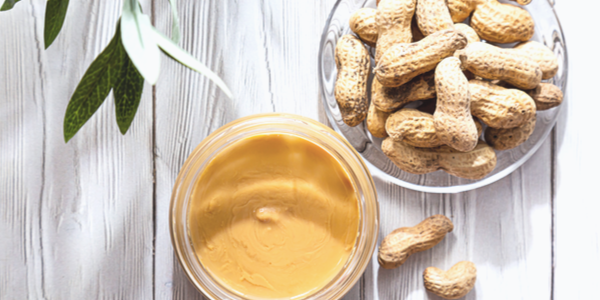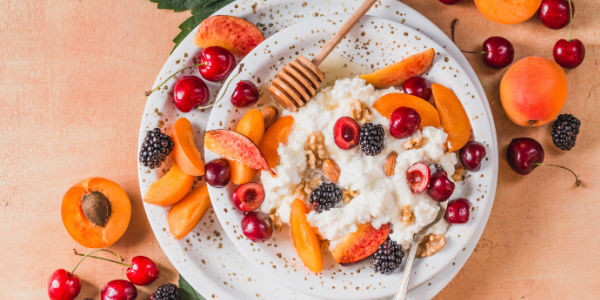
As if most of us did not already rely on too much caffeine to get through the day, the food industry added it to peanut butter! Boasted as a pre-workout caffeine supplement, caffeinated peanut butter seems tempting on the surface.
So, is the hype of caffeinated peanut butter actually worthy? Nutrition experts spoon out the facts and warn against this foodie caffeine supplement.
Does Peanut Butter Have Caffeine?
Absolutely not. Peanut butters do not naturally contain caffeine. Nutritionally speaking, peanut butter is mostly fat with some protein and very little carbohydrate. And contrary to popular belief, peanuts are legumes, not nuts.
All-natural forms of peanut butter typically only have one to two ingredients – peanuts and salt. However, conventional brands like Jiff, Peter Pan, and Skippy usually include seven to 10 ingredients. The majority of those being fillers and additives like refined sugar, hydrogenated vegetable oils, and preservatives.
Apparently, food manufacturers went a step further and added another ingredient to the mix… Caffeine.
Why Is Caffeinated Peanut Butter Problematic?
Caffeinated peanut butter would not be much worse than the flavored and enhanced forms of peanut and nut butters that claim to be more healthful than not. Well, if most did not already consume high amounts of caffeine…
But many people consume one to two cups of joe in the morning and a lot of people enjoy another one to two cups in the afternoon as a pick-me-up. Eight ounces of coffee provides about 100 to 120 milligrams (mg) of caffeine. But depending on how big those "cups" of coffee are, one could theoretically be consuming anywhere from 100 to 500 mg of caffeine per day.
Caffeine Recommendations
To maintain health, the Food and Drug Administration (FDA) recommends limiting daily caffeine intake to 300 to 400mg/day. Too much more than that and one can start experiencing adverse side effects like jitters, anxiety, nervousness, nausea, stomach cramping, diarrhea, sleep disruption, and more.
Now, caffeinated peanut butter contains about 120 grams (g) of caffeine in one tablespoon serving. This would only be slightly more than one cup of coffee.
Similarly, most people consume more than two tablespoons as a serving, adding up to 240 mg of caffeine. Peanut butter is one of those delectable foods that can be hard to portion and regulate as it stands. Adding an addictive substance (caffeine) to an already addictive food is basically just adding insult to injury.
An entire container of caffeinated peanut butter boasts 1200 mg of caffeine, and, hopefully, most people are not keen to eat an entire jar in one sitting. Such a high dose of caffeine could cause heart palpitations, irregular heartbeat, and chest pain.
However, for those with binge eating disorder or bulimia or struggle with overeating, this is a very real concern and further highlights the problems with this food product.
5 Reasons to Reconsider Caffeinated Peanut Butter
Caffeinated peanut butter was created by a trio of foodies seeking to devise the perfect hangover cure. Apparently, they were experimenting with a banana bread peanut butter sandwich. This is when they miraculously realized they should add caffeine to peanut butter to attain a slow release of energy and caffeine. In essence, they presumed the high amount of fat in the peanut butter would slow the absorption of caffeine.
Beyond the fact that the combination of fat and caffeine is hardly a hangover remedy, here are additional reasons to reconsider ever consuming caffeinated peanut products.
1. Caffeine and Disrupted Sleep
To avoid disrupting the normal circadian rhythm, health professionals recommend cutting off caffeine by noon or earlier depending on bedtime. Generally speaking, it is advisable to avoid caffeine during the eight to ten hours before shuteye. The effects of caffeine peak after one hour, but it remains in the bloodstream for an average of six hours before the liver and kidneys break it down into byproducts and excrete the waste.
Thus, consuming caffeinated beverages or food products too close to bedtime can cause problems falling asleep, disrupt REM cycles, and negatively impact the overall quality of sleep. As a result, this often spurs a vicious cycle of needing more caffeine the following day to account for poor sleep and lethargy.
2. Suboptimal Pre-Workout Fuel
First and foremost, regular peanut butter (without added caffeine) is a suboptimal pre-workout choice. As mentioned, peanut butter is mostly fat and a little protein.
Before a workout, consuming mostly carbs and a bit of readily absorbable protein if doing a strength-based workout is recommended. Carbohydrates digest the quickest of the macronutrients and directly supply muscles with fuel.
Fat takes the longest to digest, so consuming it before a workout shuttles blood flow to the stomach and intestines instead of the muscles. This can cause digestive upset like cramping and diarrhea during exercise performance.
Fat also contains the most calories per gram (9 kcals/gram compared to carbs and protein that supply 4 kcals/gram). So, eating it before a workout may stall weight loss goals because the body would not need to burn fat stores already present.
For endurance-based workouts like running, cycling, or swimming, toast with honey or jam, oat-based granola bars, or oatmeal are much better pre-workout fuel. Toast and egg whites, a protein shake, or half a serving of chicken and sweet potato make a great pre-workout meal before resistance training.
3. Un-Kid Friendly Food
The American Academy of Pediatrics suggests that adolescents consume no more than 100 mg of caffeine per day, and less so if possible. Adolescents and teens naturally boast higher levels of energy as is. Adding caffeine to the mix can make them overly excitable, unable to concentrate, and disrupt their circadian rhythm.
Yet, peanut butter is a favorite food amongst youngsters. If they were to eat one tablespoon of caffeinated peanut butter, they would already surpass the recommended limit of 100 grams.
Imagine if they made two peanut butter sandwiches with two tablespoons of caffeinated peanut butter each. That would amount to over 450 grams of caffeine, which is a likely unsafe amount for a young one.
4. Animal Accidents
As with kids and teens, peanut butter is a favorite food for many furry friends. It can serve as a sweet treat for our loving pets, but most animals encounter trouble digesting caffeine.
So, giving fur friends caffeinated peanut butter could cause serious health problems like kidney damage. Best not to shelve a pantry with caffeinated peanut butter to avoid accidental mishaps.
5. Less Nutrient-Dense
While not immensely dangerous, it is worth mentioning that peanut butter is less nutrient-dense than its nutty counterparts. However, peanuts are unfortunately one of the least nutrient-dense legumes and offer less fiber.
Yes, legumes are certainly included in a healthful diet. But because peanuts are a legume and not a nut/seed, they lack the highly touted omega-3 fatty acids. This healthy fat is responsible for antioxidant activity and contributes to heart and brain health.
No need to fear or completely avoid peanuts and their creamy form. But like everything else, it is wise to exert moderation.
The Bottom Line
Caffeinated peanut butter is most certainly not worth the hype (or lack thereof). Touted as a hangover cure and pre-workout promise, adding caffeine to peanut butter is unnecessary and likely incurs more harm than benefit.
Most people get enough caffeine as it is, and consuming caffeinated creamy peanut spreads can further disrupt sleep, potentially harm adolescents, and endanger fur friends. Not to mention peanut butter is less nutrient-dense than almond, cashew, or walnut butters.
Overall, tread such caffeinated products with caution. This especially serves true if drinking coffee and other highly caffeinated products.
Reference:
Smith A. Hangovers Create Steem, a Caffeinated Peanut Butter. CNNMoney. Published October 6, 2015. money.cnn.com/2015/10/05/smallbusiness/steem-caffeinated-peanut-butter/.







